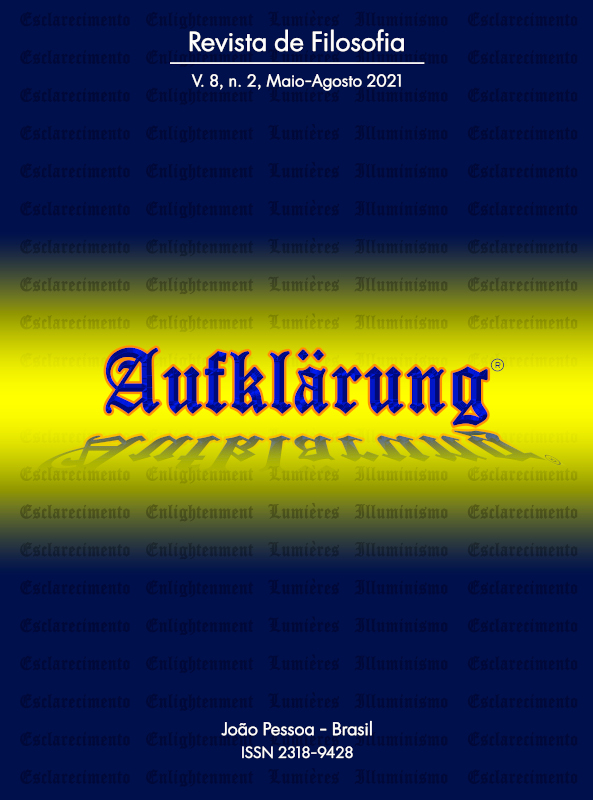Conflict and Superiority: Life and its Beyond in Nietzsche and Freud
DOI:
https://doi.org/10.18012/arf.v8i2.59482Keywords:
Nietzsche, Freud, life, limit, conflictAbstract
When approaching the Nietzsche-Freud relations with respect to the concept of life, the notion of the internal-external limit of the living being - that is, the limit of the living being itself with the outside - has been developed in a scant or tangential way. In this article we will seek to use this notion -in terms of an analytical tool- to account not only for the relationship that the living being presents from its inherent conflict with respect to the forces that are external to it, but also to account for the to address what is proper to man, the limit of life itself - that is, to account for the point from which that beyond the properly human life.
Downloads
References
ALMEIDA, R. Nietzsche e Freud, eterno retorno e compulsão à repetição. São Paulo: Loyola, 2005.
ASSOUN, P.-L. Freud et Nietzsche. Paris: P.U.F, 2008.
BARCALETT PÉREZ, M. L. Friederich Nietzsche: la vida, el cuerpo la enfermedad. Méjico DF: Univ. Autónoma de Méjico, 2006.
BERCHERIE, P. Génesis de los conceptos freudianos. Buenos Aires: Paidós, 1996.
BOOTBHY, R. Freud as philosopher, -Metapsychology aflter Lacan. Londres: Routledge, 2001.
CHAPELLE, D. Nietzsche and psychoanalysis. Albany: State Univ. of New York Press, 1993.
FAULKNER, J. ‘The Body As Text In The Writings of Nietzsche And Freud’, Minerva, 6, pp. 94-124, 2003.
FERNÁNDEZ GARCÍA, E. ‘En torno al malestar: aproximaciones de Nietzsche y Freud’. Mal-Estar Subjetivo, 1 (1), pp. 10-42, 2005.
FREUD, S. Obras completas. Buenos Aires: Amorrortu, 1992.
GASSER, R. Nietzsche und Freud. Berlín: De Gruyter, 1997.
GEMES, K. ‘Postmodernism´s Use and Abuse of Nietzsche’, Philosopy and Phenomenological Research, vol. LXII, N. 2, pp. 337-369, 2001.
GREEN, A. Pourquoi les pulsions de destruction ou de mort? Paris: Ithaque, 2010.
KAUFMANN, P. Elementos para una enciclopedia del psicoanálisis. El aporte freudiano. Barcelona: Paidós, 1996.
LAPLANCHE, J. Vida y muerte en psicoanálisis. Buenos Aires: Amorrortu, 1970.
NIETZSCHE, F. Fragmentos póstumos, vol. IV. Madrid: Tecnos, 2008.
NIETZSCHE, F. Genealogía de la moral. Madrid: Alianza, 2000.
NIETZSCHE, F. Así habló Zarathustra, Madrid: Alianza, 2007.
NIETZSCHE, F. Ecce Homo, cómo se llega a ser lo que se es. Madrid: Alianza, 1979.
NIETZSCHE, F. La ciencia jovial. Madrid: Biblioteca Nueva, 2001.
OLAFFSON, F. ‘Nietzsche’s Philosophy of Culture: A Paradox in The Will to Power’, Philosophy and Phenomenological Research, vol. 51, n. 3, pp. 557-572, 1991.
REGINSTER, B. The affirmation of life: Nietzsche on overcoming nihilism. Harvard: Harvard Univ. Press, 2006.
STEINEGER, J. ‘Friederich Nietzsche and Sigmund Freud failure: a tomist protest on truth’, Quodlibet Diary, 6 (1), pp. 23-38, 2004.
STIEGLER, B. ‘¿Qué cambia poner el cuerpo en el lugar del alma? Nietzsche entre Descartes, Kant y la biología’, Eidos, vol. 1, pp. 128-141, 2003.
SULLOWAY, F. J. Freud, biologist of the mind. Harvard: Harvard University Press, 1992.
URIBE, D. Vitalismo cósmico. Bogotá: Siglo del Hombre, 2002.
VATTIMO, G. Diálogo con Nietzsche. Buenos Aires: Paidós, 2002.
VÁZQUEZ ROCCA, A. ‘Nietzsche y Freud, negociación, culpa y crueldad: las pulsiones y sus destinos, "eros" y "thanatos" (agresividad y destructividad)’, Eikasia, 57, pp. 67-97, 2014.
Additional Files
Published
How to Cite
Issue
Section
License

This work is licensed under a Creative Commons Attribution 4.0 International License.
Journal general policy
1.This journal works under a Creative Commons License aplied to online journals. That icence can be read in the following link: Creative Commons Attribution 4.0 International (CC BY 4.0).
2.Accordingly to this License, a)the journal declares that authors hold the copyright of their articles without restrictions, and they can archieve them as post-print elsewhere. b)the journal allow the author(s) to retain publishing rights without restrictions.
Metadata Policy for information describing items in the repository
1. Anyone may access the metadata free of charge at anytime.
2.The metadata may be re-used in any medium without prior permission, even commercial purposes provided the OAI Identifier or a link to the original metadata record are given, under the terms of a CC BY license refered for the Journal.







































